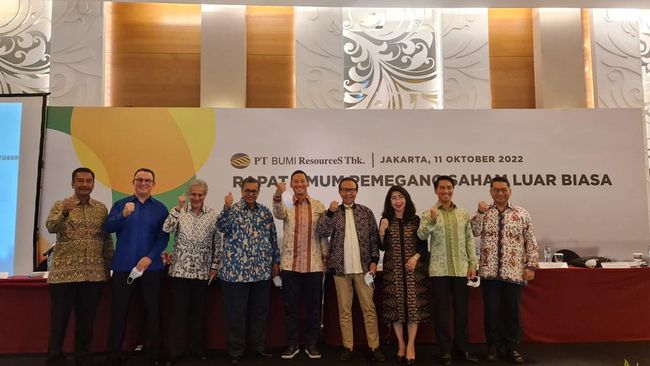Jakarta, CNBC Indonesia – In recent weeks, market participants have been thrilled by the news that the Salim Group has entered the shareholder list of PT Bumi Resources Tbk (BUMI) via private placement.
In this corporate transaction, there are two commercial entities that will absorb the new shares of BUMI. The first entity is Mach Energy (Hongkong) Limited (MEL). The next entity is Treasure Global Investments Limited (TGIL).
MEL will take 85% of the 200 billion new shares issued by BUMI at a price of Rp 120 per share through private placement. While TGIL will absorb the remaining 15%.
ANNOUNCEMENT
Scroll to resume content
As is known, the composition of MEL’s shareholders is PT Bakrie Capital Indonesia which owns 42.5% of the shares of MEL. Subsequently, Clover Wide Limited controlled 15% of the shares. Finally, Mach Energy (Singapore) Pte. Srl (MPEL) owns 42.5% of the shares of MEL.
Well, Mach Energy Pte. Srl is a company of the Salim Group. Anthoni Salim has full control of Mach Energy Pte. Srl ..
After the settlement private placement, both BCI and MPEL will jointly control MEL. All decisions made by MEL will be mutually agreed by BCI and MEPL.
Citing Forbes, Salim and his family were ranked third on the list of the 50 richest people in Indonesia with a net worth of $ 8.5 billion when he was released last December. The Salim Group has activities in the food, retail, banking, telecommunications and energy sectors. Salim is also famous for owning Indofood, one of the largest instant noodle makers in the world.
Not a few think so merge control what the two main groups do can make significant changes to BUMI for the better. In addition, the funds obtained from BUMI’s corporate operations will be used to pay off BUMI’s debts.
Bumi, which is Indonesia’s largest coal producer, is undergoing a debt restructuring process that leaves debt currently estimated at around $ 1.5 billion.
Samuel Sekuritas Indonesia analyst Jonathan Guyadi revealed in his research that with these steps, BUMI could save around $ 130 million annually in interest expenses.
In fact, according to Samuel Sekuritas, BUMI is expected to increase net profit in 2023 by 13.4% thanks to a decrease in interest expense to $ 36 million (previously $ 156 million).
“We believe that the entry of new strategic investors can help BUMI improve its CSR and governance, as well as develop a long-term energy transition strategy,” said Jonathan a few days ago.
Previously, BUMI management was also optimistic that the company’s performance would improve in the future, supported by a lower debt ratio. So that in the end BUMI can significantly increase its performance.
Next article
Bumi Resources reveals the challenges and prospects of RI’s coal business
(dpu / dpu)


